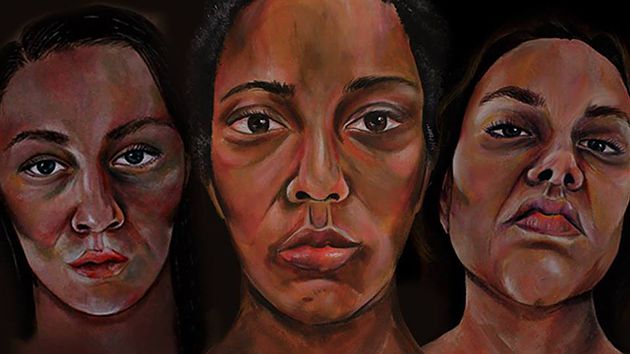Matt Loveranes
This is the pervading sentiment and rally call behind Last Meals, Keely Meechan’s first professional theatrical outing, which features nine monologues from nine women from around the world, all on death row.
The show opens strongly with Hannah Kelly’s larger than life “Hamburger”. Kelly has incredible stage presence and clearly has fun with her character, milking her accent for all its worth, while subtly shading it with vulnerability. It is a confident start that sets the tone of the piece. The women that follow (Keagan Carr Fransch, Ellie Stewart, Georgia Latief and Karen Anslow) either veer towards the more comedic or the intensely harrowing to varying degrees of success. The show jolts to life once again with Lucy McCarthny’s “Tic Tac”. The writing is simple yet clever in this section, showing awareness of its genre’s tropes and stereotypes and McCarthny fully revels in playing the clichéd psychopath and starts a run of considerably strong sections led by a riotous Jean Sergent, a deliciously feral Trae Te Wiki and finally, a world-weary Jessica Old. It is this last section that hits the hardest because it is perfectly mundane yet incredibly familiar. It is the realest. The closest to us. And therefore the scariest.
The problem most monologue shows usually encounter is that the structure clearly highlights the disparity in quality between the different sections, both in the writing and the performances. Unfortunately, Last Meals does not escape this pratfall. Some accounts are just more well written than others just as some accents are better performed. Despite this, the show is still very much a success. The women prove to be a tight and fully committed ensemble. And when not performing their individual monologues, they are used effectively to highlight the mood of any given piece being performed. This is thanks to director Ben Emerson’s acute vision and it is a testament to his, Meechan’s and the incredible ensemble’s collective talents that the audience is rapt for the duration of the show.
Certainly some of the show’s appeal stems from the allure of “women in prison”, enough so that it constitutes its own genre. Something about women, in particular, doing bad things seems to capture general audiences’ fascination. However, the stories within the genre are usually used as a tool by men to either fetishise (countless exploitation films) or glamourise (Chicago, for example) prison and while a few of these works (Chicago, again) have their merit, very few get into the true horrors behind these women’s stories. It took till the woman-helmed Orange is the New Black to infuse this genre with colourful, three-dimensional women, at least for mainstream consumption. Thankfully, Meechan follows in the Netflix program’s tradition (the costuming indicates a visual nod at least), showing the humanity and horror in the women she has created without losing any of the comedy and sharpness in the process. She is also seemingly indebted to Ntozake Shange’s for coloured girls who have considered suicide / when the rainbow is enuf, the gold standard for shows of these nature. The social commentary buried under her spirited writing proves that Meechan’s show attempts to be much more than just a soliloquised Cell Block Tango.
Meechan is an exciting new voice in the local scene. Whether she continues to play with genre fare remains to be seen. For the moment at least, Last Meals is an entertaining night out and is certainly worth a taste.
Random Thoughts:
- This is a very aesthetically interesting show. The painted mugshots (also done by Meechan) are extremely effective promotional material and I’m somewhat impressed by the expense paid to having the programmes be artistically consistent with the show’s feel.
- A shout out goes to the talented Rowan McShane for effectively conveying a very cold and clinical mood with his lighting design.
- Finally, while the “last meals” was a clever device used to let us know these women, I found it curious none of them plumped for any stereotypical last meals like a steak, perhaps… or lobster… or a bucket of fried chicken. Completely pointless observation.






